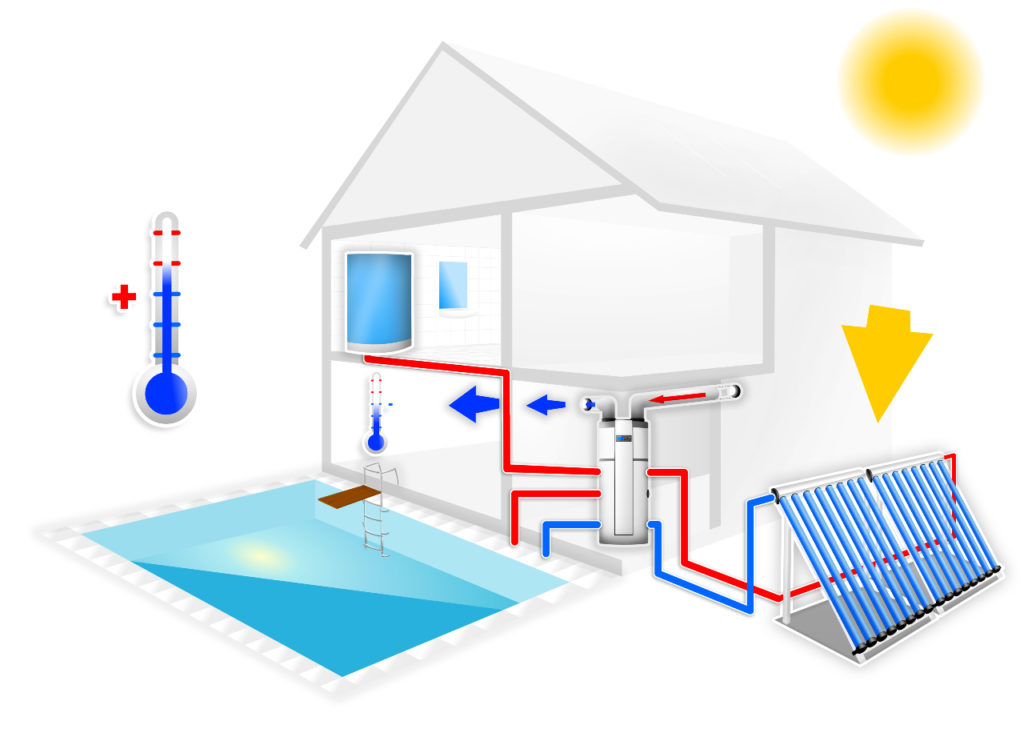In most parts of Australia, we’re lucky to have about five months of summer weather to use our pool in every year. Which is great – with our extended, sweltering summer weather, it’s no wonder that pool ownership is on the rise here. But for the nearly three million Aussies who have them, getting five out of 12 months use per year can seem a disappointing return on one of their biggest investments. This is where a swimming pool heater comes in.
Pool heating can double the value you get out of your investment, keeping the water at the perfect temperature for swimming all year round. So what’s the best pool heating option for your pool?
To help you decide, here are the different pool heating options available in Australia, including electric, gas and solar pool heating.
Pool heating options Australia
Solar pool heating: cost effective and environmentally friendly

Australia’s sunny weather means we have unrivalled access to solar energy, so it’s no surprise that solar has become the most popular pool heating option. Using the natural energy from the sun rather than electricity off the grid, a solar pool heating system will save you thousands on electricity bills throughout the life of your pool.
Solar systems work through a solar pump, which uses a very small amount of electricity to push water through a network of tubes to heat it up. On a sunny day, a solar swimming pool heater will warm the water temperature by an entire two degrees.
Solar pool heating systems work best in places that get a lot of sun, so will be reliable for more months of the year in most parts of Queensland, New South Wales and the Northern Territory.
Electric pool heating: reliable heaters for cloudier climates
Electric swimming pool heaters, also called ‘heat pumps’, are relatively popular in Australia, particularly in places where winter is cloudy, such as Melbourne. This is because persistent cloudy weather will render a solar system useless.
Electric pool heating systems work by collecting heat from the air and transferring it back into the pool water via a heat exchanger. They’re relatively cheap and cost-effective, and usually work faster than solar systems when it comes to heating your pool up.
The key benefit of an electric swimming pool heater is that it can work anytime, in any weather, whereas a solar system needs sunshine. The downside is that these systems use a lot more electricity off the grid than solar ones, so they’ll cost you more in household bills down the track and are less environmentally friendly.
Gas swimming pool heater: more expensive, but best for spas
Gas pool heating systems are the most popular option for spas, with the capability to heat water to any temperature you choose, any time of the year – and fast. In fact, a gas heater can heat an average-sized spa in about an hour.
But this functionality comes at a cost.
Gas is a non-renewable resource that is harmful to the environment, making this pool heating option both the most expensive and least environmentally friendly. Some people who take using their pool all year seriously have a gas heater as a backup for when their solar system can’t get enough power to do the heating.
What’s the best swimming pool heater for you?
Which pool heating option is best for you depends on your circumstances. Make sure you consider:
- The average temperature where you live
- How much sunshine your region gets
- How often you want to swim in your pool
- Whether you want to swim throughout the whole year
If you’d like some more information about pool heating options ahead of winter, get in touch! One of our friendly technicians will explain your options and recommend – and install – top quality equipment before you can say ‘cold’.

